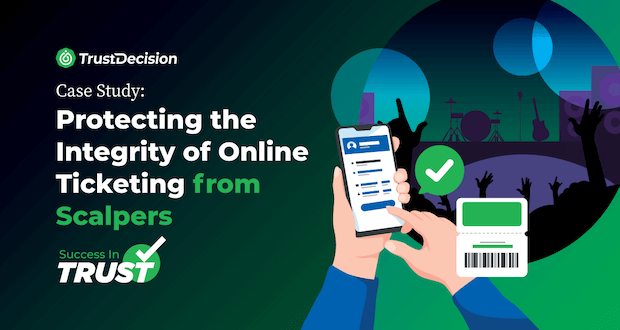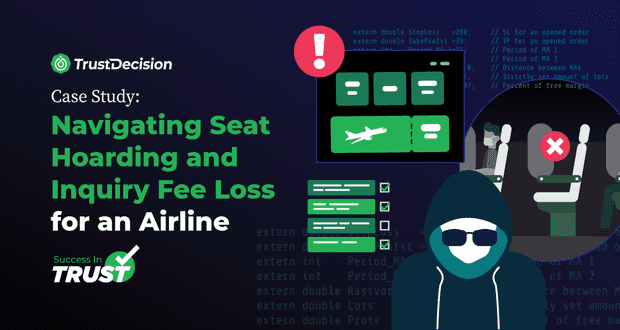Digitalization has transformed ticketing from a traditional in-person experience into a virtual race against the clock. Gone are the days of waiting in long lines for a blockbuster movie; now, people from around the world compete online for pre-sale access to a pop star's concert or the launch of an artist's collection. While ticketing digitalization has brought greater convenience to a global audience, it has also opened the door for fraudsters to exploit the system with unfair tactics.
In this case study, we’re going to probe into a Chinese-based event ticketing platform which suffered from severe ticket scalping and re-sell price manipulation, and how TrustDecision has helped to revert the situation, blocking over 28 million fraud risks and saving over 14 million USD.
The Challenges
Ticket Scalping is a fraudulent practice that undermines the integrity of ticket sales and customer satisfaction. These scalpers exploit the high-demand events by using automated bots to purchase large quantities of tickets in seconds, only to resell the tickets at significantly inflated prices on secondary markets. This practice harms both event organizers and legitimate customers, bring significant challenges to the industry. Let’s take a look at how this happens.
Bulk Registration and Login
Scalpers create multiple accounts using real-name registered SIM card. To enhance efficiency, some deploy large modem pools to covertly intercept SMS verification codes from legitimate numbers, bypassing registration checks. By leveraging scripts with a high volume of phone numbers, they can swiftly secure tickets the moment they are released.
Automated Ticket Purchasing
Scalpers use scripts that bypass ticket purchase limits, enabling them to buy tickets in bulk within seconds of release. While these scripts mimic human behavior, they operate at a speed and scale that far outpaces genuine customers. Later, it was discovered that many of these bulk purchases were associated with disguised IP addresses or unusually repetitive devices—red flags for identity and access fraud. This allowed the scalpers to bypass geo-restrictions on certain products and even carry out account takeovers.
Market Manipulation
After securing a large portion of the tickets, scalpers can control supply and drive up prices. This creates fake scarcity and puts pressure on desperate fans to buy tickets at steep markups.
Resale on Secondary Markets
Scalpers list these tickets on various resale platforms at several times the original value. It profits heavily at the expense of the original event organizers and ticketing platforms.
Governments worldwide have enacted regulations to combat ticket scalping. In China, the Ministry of Culture and Tourism, along with the Ministry of Public Security, mandates that platforms allocate at least 85% of tickets to the public and prevent scalping, with penalties for non-compliance, including suspension or shutdown. In Singapore, ticket scalping is regulated by the Singapore Ticketing Code of Practice, Theatres Act, and consumer protection laws, with event organizers enforcing rules to prevent reselling above face value and ensure fairness for consumers.
But these regulations primarily focus on governing platform behaviors, while fraudsters’ ticket hoarding activities remain largely unchecked, ultimately leaving the platform and audience the final bearers of the responsibility and loss. Fraudsters continue to exploit loopholes, hoarding tickets and reselling them through various channels, including social media platforms, forums, or private networks such as WeChat groups. Despite regulatory efforts, these underground markets remain a challenge for enforcement.
Our Solutions
To effectively identify the above mentioned fraud risks, we helped to implement a holist anti-scalping strategy covering the event lifecycle to protect against ticket scalping and ensure a fair experience for everyone.
Pre-event Risk Anticipation
The process begins well before the event itself, starting with closely monitoring market trends, such as social media public discussions, underground forums and dark web platforms to uncover emerging fraud tactics. That way, we can predict which events/tickets are most vulnerable to scalping. This gives us the insight needed to target our resources effectively, ensuring we focus our efforts on the highest-risk events.
Real-time Strategy Optimization
We maintain an agile approach during the event as fraud tactics evolve. Scalpers may shift from simple automated bots to more sophisticated methods, such as device spoofing or human-assisted fraud. We continually adjust our fraud detection algorithms real-time based on accumulated historical data to address these evolving threats. Additionally, we tailor our detection strategy to each event's specific needs. While some events may require a more balanced approach to preserve the user experience, others may necessitate stricter controls to combat significant fraud risks.
Offline Retrieval & Sample Analysis
Following the event, our work continues with post-event analysis. We review transaction data to identify any fraudulent activities that may have been missed during real-time monitoring. By analyzing these findings, we refine our fraud detection models, ensuring that we are better prepared for future events.
Invalid Traffic Identification
Later to this case, we've developed a strategy to more effectively address ticket scalping using our Invalid Traffic Identification solution, which tackles key challenges in protecting high-demand events. This solution is lightweight, cost-efficient, and designed to handle scenarios with extremely high QPS. By using SDK-based encryption to generate unique signatures, it quickly detects invalid or machine-driven traffic before it reaches the servers. This allows for real-time risk mitigation, without the need for complex data collection or server-side communication. The result is a seamless experience for legitimate customers, ensuring they have access to ticketing platforms without the interference of fraud. This added layer of protection blocks fraudulent activities at the source, preserving the integrity of the ticketing process, especially during high-traffic events like concert pre-sales.
Results
Over a 30-day period, the platform implemented the customized risk control system and closely monitored its effectiveness. This solution not only ensure regulatory compliance, but also achieved remarkable results financially:
28 Million
Risks intercepted
$ 14 Million
Financial loss avoided
Conclusion
Ticket scalping undermines the integrity of authorized platforms, affecting financial health, customer loyalty, and regulatory compliance. This case study demonstrates the effectiveness of comprehensive fraud prevention strategies to mitigate ticket scalping and protect its customers. Online ticketing platforms should adopt a multi-layered strategy, including proactive intelligence to anticipate threats, scalable real-time adjustments to counter evolving tactics, and thorough post-event analysis to refine future defenses. By implementing these practices, not only it ensures regulatory compliance, it can also enhance security, protect revenue, and uphold customer trust.







.png)





